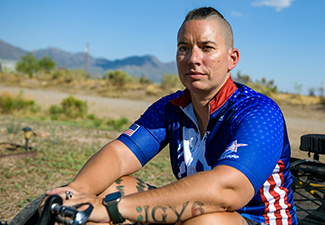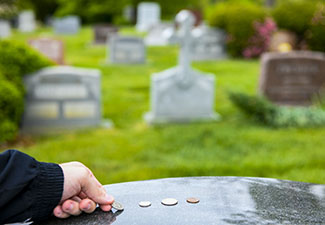Veterans Reflect on Survival, Loss, and Purpose on Alive Day

| Table of Contents | |
| Andrew Coughlan | |
| Ryan Kules | |
| Beth King | |
| Carlos De Leon | |
| Sean Karpf | |
Ask a veteran about important dates in their military career. You might hear about the day they enlisted, their first deployment date, or their Alive Day.
An Alive Day is the anniversary of the date a veteran almost lost their life in service. It's a deeply personal milestone for many warriors.
Depending on who you ask, you’ll get different answers about how veterans recognize their Alive Day. For some veterans, their Aive Day is a time of gratitude. They may celebrate by sharing memories or an appreciation for life. For others, it’s a solemn reminder of their fellow service members who didn’t make it home.
While the military community recognizes Alive Day, anyone who has overcome a life-threatening experience, such as a severe injury or illness, can have an Alive Day.
Andrew Coughlan
July 19, 2004.

Andrew (left) with fellow soldiers Dale Lloyd and Charles Persing, who saved his life.
A day forever etched in Andrew Coughlan’s memory. On this day, the former U.S. Army specialist survived a mortar fire attack in Iraq. But it’s also the day that took the lives of fellow soldiers, including his squad leader and close friend, Charles Persing, who shielded Andrew from the blast.
Initially, post-traumatic stress disorder (PTSD) and the weight of survivor’s guilt led Andrew down a dark path of isolation and self-destructive behavior. “Every year, I would sit on my couch and drink alone, thinking about my squad,” he said.
Even after Andrew joined Wounded Warrior Project® (WWP) in 2007 as its first outreach coordinator, he often spent this day in a dark place.
About seven years ago, Andrew began to shift his perspective. He decided to host an Alive Day party with fellow veterans and coworkers. Andrew found comfort in sharing stories and recounting memories of his fallen friends. He realized that beyond the trauma, there were genuine moments of laughter and camaraderie.
Andrew’s parties paused during the COVID pandemic, but he refused to fall back into old habits. “I had to find a better way to mark the day. I always enjoyed running to clear my head.” So, on his anniversary, Andrew hit the streets and began running — a mile for every year. His 17th anniversary even became a fundraising event for WWP, raising $15,000.
“My life was saved in Iraq, so it’s a form of repayment. I’m paying it forward because it’s the right thing to do to help other warriors, and I can do it,” said Andrew, who has been sober for five years and now serves as WWP’s regional alumni director in Arizona.

Ryan Kules took up rowing for fitness, but hopes to commemorate his Alive Day with a rowing record.
Ryan Kules
November 29, 2005
It was a morning like any other. Army Capt. Ryan Kules remembers returning from an early patrol near Camp Taji, Iraq. His next memory was waking up at Walter Reed National Military Medical Center in Maryland.
The vehicle Ryan was in hit an improvised explosive device planted in the road.
“I woke up from a two-week coma and had to process that not only was I missing two limbs, but I had also lost two of my men,” Ryan said.
Soon after, Ryan met Jim Mayer, a Vietnam veteran and double amputee who often visited the hospital to connect with other wounded service members.
“Jim walked into my hospital room and told me that his Alive Day was something to celebrate, not mourn,” Ryan said. “That outlook stuck with me and helped me see a path forward.”
For nearly two decades, Ryan has carried that perspective with him, spurring him to become an advocate for veterans. Today, he serves as the director of Project Odyssey, an adventure-based mental health program from WWP.
“Alive Day is bittersweet — I carry the memory of those we lost, but I also make the choice to celebrate the life I was given.”
Typically, Ryan commemorates the day with family and friends, taking time to think about goals for the future and honor those who didn’t come home.
This year, on the 20th anniversary of his Alive Day, he is planning something that has never been done before.
Ryan, who took up rowing to improve his cardiovascular health, hopes to celebrate by setting a world record for the longest row by a double amputee on a rowing machine.
“It’s an opportunity to grow and inspire other,” he said.
Beth King
July 25, 2011.

Beth King receives a new tattoo on the anniversary of her Alive Day.
This marks the day Beth King survived a rocket-propelled grenade that hit the Chinook helicopter she was in. Fire consumed the aircraft as she dangled from her uniform’s backstrap, barely escaping before it crashed. Miraculously, all 13 soldiers onboard survived, but Beth sustained significant injuries and emotional trauma.
Returning home, she struggled with the enormity of what had happened. “When I first got back, I refused to talk about it,” said Beth. “No one could comprehend what I felt like because there aren’t that many people who have been shot down and then had the aircraft burned under them.”
As Beth tried to find a way forward from her trauma, she found art therapy. “I liked not having to drudge up or talk about something. I could create something.” Then, she found solace in an unexpected art form — tattoos.
“I got my first one to help me find levity,” explained Beth, who sketched her design – a phoenix, symbolizing rebirth, with a person dangling from its claws. Etched across the bird’s chest is the tail number of the downed helicopter. “Since we referred to helicopters and other aircraft as birds, I thought it was ironic to use a bird of fire since mine went up in flames.”
Since then, on the anniversary of her Alive Day, Beth has designed a new tattoo to mark another year of survival, growth, and healing. “It’s like my journal. They remind me of everything I’ve overcome,” she said.
Carlos De Leon
Aug. 11, 2007.

Carlos honors his Alive Day by living with gratitude daily.
A mortar round nearly took Carlos De Leon’s life when it struck near his base in Iraq. Though the physical wounds eventually healed, the psychological scars took the former U.S. Army veteran longer to address. “At first, I didn’t look at it any differently – it was, “I’m good, I’m here” – and I focused on my physical injuries,” said Carlos, who got engaged with WWP and took up running marathons, boxing and other activities.
But over time, Carlos said he realized his injuries and the military did not define him. “My mentality changed and that allowed me to get to a space to become stronger not just physically. I saw veterans doing great things in their life and was inspired by that.”
In 2019, Carlos launched a cigar business, leaning into the “therapeutic aspects of sitting back and engaging in conversations.”
For him, Alive Day isn’t something he actively celebrates. "I acknowledge it, but don’t go out of my way to mark it. It’s just another day," he said. Carlos said he prefers to live each day in gratitude and sees the anniversary day as a reminder to honor those who didn’t survive. "I try to live in a way every day that honors and respects those who didn’t get a second chance," he said.
Sean Karpf
June 15, 2012.

Sean honors his second chance at life with acts of service and mentorship.
This is the day Sean Karpf’s military career ended. The former Army sergeant and weapons squad leader was on a dismounted patrol in Afghanistan when he stepped on the pressure plate of an improvised explosive device. In an instant, he found himself in a crater of dust, unable to see, hearing ringing in his ears and muffled shouts.
Medically evacuated under enemy fire, Sean’s injuries altered his life plan. He sustained a traumatic brain injury (TBI) and lost his left leg below the knee.
Losing that dream left Sean angry and aimless. “I had planned to serve 20 years, and instead, I was facing a completely different future,” he said.
He credits a quadruple amputee he met at Walter Reed National Military Medical Center for teaching him not to feel sorry for himself. It was also there he learned about Alive Day.
“I used to say I just got lucky. But now, my Alive Day is more important to me than my birthday. Not everyone gets a second chance. I have to make mine count,” he said.
For each veteran, Alive Day is deeply personal. Whether celebrated or not, the date of a warrior’s near-death experience is a reminder of hardship and resilience, offering the opportunity to honor others and live life to the fullest.
Learn more about how WWP empowers warriors to heal trauma and find a new mission. In addition to various mental health resources, WWP offers physical health and wellness initiatives, financial and benefits support, career assistance, and connection programs to support a lifetime of well-being.
Contact: Cynthia Weiss – Public Relations, cweiss@woundedwarriorproject.org, 904.738.2589
About Wounded Warrior Project
Since 2003, Wounded Warrior Project® (WWP) has been meeting the growing needs of warriors, their families, and caregivers — helping them achieve their highest ambition. Learn more about Wounded Warrior Project.


